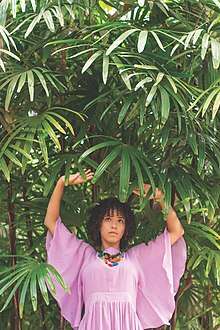Kaia Kater
| Kaia Kater | |
|---|---|
 Kaia Kater July 2018 | |
| Background information | |
| Born |
1993 Montreal |
| Origin | Grenadian-Canadian |
| Genres | Folk, Roots, Jazz, Americana, Indie |
| Instruments | voice, banjo, piano, guitar |
| Labels | Smithsonian Folkways Recordings (Outside Canada) |
| Website | kaiakater.com |
Kaia Kater (b. Montreal, age 25)[1][2] is a Canadian singer-songwriter, guitar, piano and banjo player. Kater was born in Montreal, where she spent her early childhood in Mile End.[2] She also lived in Wakefield, Ottawa and Winnipeg before attending Davis & Elkins college in Elkins, West Virginia on a banjo scholarship.[3][4] In Elkins, she also learned to flatfoot and deepened her knowledge of body percussion (hambone).[4] Kaia's mother is from Quebec, and her father immigrated to Canada from Grenada as a teenager. Kaia's 2018 album, Grenades, explores her personal history, including the story of her father's childhood and journey to Canada.[5]
Kaia's grew up spending significant time in the North American folk music community, attending festivals, camps and conferences frequently during her teen years.[6] She released her first EP Old Soul in 2012, and her first full-length album Sorrow Bound in 2014.[7]
In 2016, she won the "Pushing the Boundaries" award at the 12th Canadian Folk Music Awards for her third album, Nine Pin.[8] The Guardian reviewed it as "tremendous" with four stars out of five.[9] Rolling Stone noted Kater's mixture of traditional banjo playing and "sobering, honest lyrics exploring all-too-current themes including poverty and racism...a quiet, yet powerful storm", naming her a "need to know" artist of 2016.[1] In 2018, Kaia announced that her fourth album Grenades would be released on Smithsonian Folkways Recordings outside of Canada, and in partnership with acronym Records in Canada.
In 2017 and 2018, Kaia toured extensively, performing at venues and festivals throughout the United States, Canada, Europe and the United Kingdom, including a performance at the at the Kennedy Center, at the invitation of the Grammy Museum as part of a tribute to Pete Seeger.[10] Kaia performed at the 2018 Newport Folk Festival, with Rolling Stone highlighting her performance as one of the '12 Best Things We Saw' [11] and Carnegie Hall announced Kaia's performance as part of Migrations: The Making of America as part of their 2018-2019 season.[12]
While influenced by folk music, Kaia's artistic scope is broad. She cites Nina Simone, Erykah Badu and Lauryn Hill as important voices in shaping the direction of her artistic, social and political expression.[13]
References
- 1 2 Stephen L. Betts (May 4, 2016), "10 New Country Artists You Need to Know: May 2016", Rolling Stone
- 1 2 Amara Thomas (December 14, 2017), "Kaia Kater's music is beautiful proof that banjos aren't just for hillbillies and the Confederacy", The Fader
- ↑ "Ottawa acts vie for Canadian Folk Music Awards". Ottawa Citizen. 2016-09-22. Retrieved 2018-10-11.
- 1 2 Deutsch, Joni. "Kaia Kater: A Portrait of a Young Quebecalachian". Retrieved 2018-10-11.
- ↑ "Shifting gear, digging roots - SOCAN Words and Music". SOCAN Words and Music. 2018-09-26. Retrieved 2018-10-11.
- ↑ "How the banjo helped Kaia Kater understand her Afro-Caribbean roots | CBC Radio". CBC. Retrieved 2018-10-11.
- ↑ "Kaia Kater". kaiakater.com. Retrieved 2018-10-11.
- ↑ 2016 Canadian Folk Music Awards recipients announced, Canadian Folk Music Awards, December 4, 2016
- ↑ Neil Spencer (August 28, 2016), "Kaia Kater: Nine Pin review – where bluegrass meets Nina Simone", The Guardian, Manchester UK
- ↑ "Kaia Kater To Perform In Pete Seeger Tribute At Kennedy Center". Quicksilver Productions. Retrieved 2018-10-11.
- ↑ Doyle, Jonathan Bernstein,Patrick (2018-07-30). "Newport Folk Festival 2018: 12 Best Things We Saw". Rolling Stone. Retrieved 2018-10-11.
- ↑ "Karine Polwart Kaia Kater - 3/23/2019 9 PM". www.carnegiehall.org. Retrieved 2018-10-11.
- ↑ "Kaia Kater Explores The Heavenly and The Sinister on "Saint Elizabeth"". Noisey. 2016-06-20. Retrieved 2018-10-11.
Further reading
- "Kaia Kater On World Cafe", World Cafe, NPR, October 4, 2016
- Ben Edwards (February 22, 2018), "How the banjo helped Kaia Kater understand her own Afro-Caribbean roots", Q, Canadian Broadcasting Corporation
- Chaka V. Grier "Shifting Gears, Digging Roots" SOCAN Magazine September 26, 2018 https://www.socanmagazine.ca/features/shifting-gear-digging-roots/
External links
- Official website
- Smithsonian Folkways Recordings https://folkways.si.edu/artists/kaia-kater